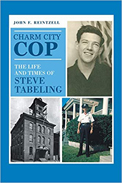
 |
School terrified Steve Tabeling. That's likely because he dropped out of seventh grade and spent so much time before that playing truant that he was functionally illiterate when he quit. By the time he was twenty-five, though, he was married to his childhood sweetheart and the father of four. He needed steady work to support them. He also wanted to do something that mattered, to make up for being an anxiety-ridden disappointment to his harsh, alcoholic father. That's when he decided to pursue a career in law enforcement—an ironic choice for someone who was a serial car thief by age fourteen. Fortunately, he was never arrested for any crime and escaped his youth without a juvenile record. Of course, he also ended us lacking the eighth-grade education that was a requirement for applicants to the Baltimore Police Department in the late 1950s.
Tabeling, however, was not a man to give up on his ambitions. Undaunted, he obtained that education, and then a high school equivalency certificate and four college degrees in the field of psychology, all while maintaining an unrelenting work schedule. He worked variously as a homicide detective, the head of hospital security for Johns Hopkins University, and as the chief of police for Salisbury, Maryland. His rise through the ranks afforded him opportunities to thwart departmental corruption, rectify shoddy police procedure, and break up strikes nonviolently. As he gained life experience, he also came to appreciate the value of continuing classroom education and spent a significant portion of his career as an instructor at the police academy in Baltimore.
Tabeling learned from his own instructors' shortcomings. He did everything he could to make his classes engaging and to inspire passion for the job in his students. For more than sixty years, Tabeling served in some aspect of law enforcement. Police officers take an oath to protect and serve, and whether Tabeling was guiding potential officers through written coursework, interrogating a reluctant or hostile suspect about a crime, or wrangling justice for a murder victim out of the ponderously slow court system, he never forgot the humanity of those for whose benefit he took that vow.
Unlike many true-to-life stories of police work, this one is not a typical autobiography. Rather, it is Tabeling's account of his professional and personal life, as told to his dear friend and fellow policeman, Reintzell. This book contains more forewords, introductions, and prefaces praising its subject than most works of this nature, which might cause some readers impatience if they are eager to begin reading its main text. However, Tabeling is an unassuming person, so any trumpeting of his numerous achievements must come from others. The book demonstrates that even many of those who clashed with him entertained grudging respect for his integrity and work ethic.
Although he didn't personally pen this one, Tabeling is also an author, having written You Can't Stop Murder: Truths About Policing in Baltimore and Beyond. It discusses some of the most violent crimes committed in Baltimore in the 1960s and 1970s, Tabeling's role in their solutions, and how their outcomes affect contemporary police procedures. Fans of other biographical accounts about police officers in big cities, such as R.J. Rice's I Do Solemnly Swear: Life as a Philadelphia Cop as well as L.A.'s Last Street Cop: Surviving Hollywood Freaks, the Aryan Brotherhood, and the L.A.P.D.'s Homicidal Vendetta Against Me by Al Moreno will likely enjoy Reintzell's book, as well. His work about an exceptional man could also serve as a text for a criminal psychology course.